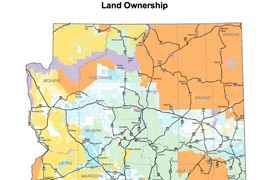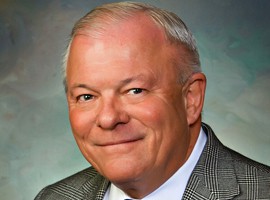Cronkite News has moved to a new home at cronkitenews.azpbs.org. Use this site to search archives from 2011 to May 2015. You can search the new site for current stories.
One option in ongoing feuds with Washington: Tell the feds to go away
WASHINGTON – Jack Biltis moved to Arizona from Montreal at age 16 to “escape” from what he said was Canada’s more-socialized government. He’s not about to take marching orders from an overreaching central government in his adopted home.
That’s why the Phoenix businessman is pushing a ballot initiative that would let Arizona voters “reject any federal action that they determine violates the U.S. Constitution.”
“It’s a very simple proposal,” Biltis said. “It gives the Arizona people the right to check-and-balance the federal government.”
His Checks and Balances in Government initiative is one of at least two measures currently being considered in Arizona that would let the state tell the federal government to buzz off.
The other is a bill from state Sen. Al Melvin, R-Tucson, that would require the federal government hand over to the state the millions of acres of land it holds in Arizona by 2014, or start paying property taxes. The bill, SB 1332 has passed both the House and Senate and is awaiting action by Gov. Jan Brewer.
“It’s really blatantly unfair,” how much land the federal government owns in Western states, Melvin said. “I believe, and others believe, that the Forest Service, Bureau of Land Management and others are totally mismanaging these federal lands.”
While the measures may be popular in Arizona – Biltis is so confident he can get the 250,000 signatures needed to put his initiative on the ballot that he is mortgaging his house for the campaign – experts say they would stand little chance of holding up in court if passed.
Melvin’s bill in particular is a legal “non-starter” because both the federal Constitution and Arizona Constitution make it “crystal clear” the lands are rightfully federal possessions, experts say.
“It makes a good scapegoat,” said Joseph Feller, a property law professor at Arizona State University’s Sandra Day O’Connor School of Law. “You have this huge amount of land out there and it’s easy to say, ‘Wow, our economy would be booming if only the state could grab vast amounts of federal land.’
“But these lands are not filled with gold,” he said with a laugh.
To Gregg Cawley, a political science professor at the University of Wyoming, proposals like Biltis’ and Melvin’s are little more than ploys that conservatives use to ratchet up anti-federal sentiment anytime they want to gin up political support. Cawley has written about the Sagebrush Rebellion of the 1970s and 1980s, in which some Western states demanded control of their federally held lands.
“What’s intriguing to me is how that animosity spreads from issue to issue,” Cawley said, noting immigration as an obvious example of federal-state friction. “It just gets repeated over and over again and people just nod their heads.”
But Biltis, for one, is not nodding his head along with other Arizona conservatives. He does not support SB 1070, the state’s controversial immigration enforcement bill, for example, saying he considers immigration to be a federal matter.
But he still thinks Washington has overreached its authority in many other areas, and hopes the Supreme Court will strike down President Barack Obama’s health-care reform law.
If it doesn’t, his Checks and Balances in Government initiative would let Arizona voters decide.
An initiative like his might have little shot of becoming law in most other states, but Arizona is not like most other states. Biltis said that early polls have indicated strong support for his measure.
Biltis, the president and owner of TAG Employer Services, hopes his initiative will inspire other states to seek similar remedies to push back against an overreaching federal government.
Arizona – and the country – needs more checks and balances than just the Supreme Court, Biltis said.
“As good as they are, they don’t always get it right,” he said of the Supreme Court’s justices. “They’re on the salary of the federal government.”









